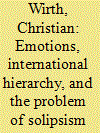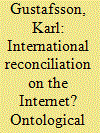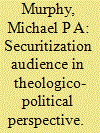|
|
|
Sort Order |
|
|
|
Items / Page
|
|
|
|
|
|
|
| Srl | Item |
| 1 |
ID:
172287


|
|
|
|
|
| Summary/Abstract |
This study offers an explanation for Beijing’s seemingly self-defeating approach to the South China Sea that distances China ever more from the regional and international communities which it wants to lead and join while drawing in the foreign military presence that it seeks to keep at a distance. Combining recent research on the role of emotions and on hierarchy in international politics, this article shows how the powerful narrative of national ‘humiliation’ and ‘rejuvenation’ has informed Chinese maritime politics. As the South China Sea became incorporated in the linear timeline of China’s 5000 year civilizational history, the US’ and its allies’ push-back against Beijing’s territorial claims deepened China’s ideational isolation. The ensuing state of solipsism increases the risk of violent confrontations.
|
|
|
|
|
|
|
|
|
|
|
|
|
|
|
|
| 2 |
ID:
172286


|
|
|
|
|
| Summary/Abstract |
This article explores the Internet’s often touted potential for facilitating reconciliation. It conceptualises Wikipedia as a site for collective memory construction and analyses the Chinese- and Japanese-language entries on the bilaterally contentious Second Sino-Japanese War. It addresses the question of how to make sense of the construction of these online collective memory narratives theoretically. Both historical determinism and instrumentalism – two influential theoretical approaches to collective memory and reconciliation – have great difficulties in fully accounting for this case. Instead, it is argued that ontological security theory is better equipped for understanding collective memory construction in Wikipedia. It is suggested that ontological security seeking can impede efforts for reconciliation even when, as in Wikipedia, there exist norms seeking to promote more neutral narratives. It is argued that a subtle bias in favour of the in-group and against the out-group functions as a mechanism for ontological security management that protects a positive self-identity.
|
|
|
|
|
|
|
|
|
|
|
|
|
|
|
|
| 3 |
ID:
172290


|
|
|
|
|
| Summary/Abstract |
The article attempts to assess the importance of informal networks in achieving internationally recognised academic standards set in four Balkan countries by the reform of higher education institutions and the International Relations (IR) profession in particular. Starting from the core-periphery division of the Global IR, the authors are examining the results of these reforms by focusing on the neoliberalisation of the university and the professional subordination of peripheral IR communities to the Western-dominated epistemic community (including ‘brain drain’ and recruitment of ‘organic’ intellectuals). Based on the interviews conducted with Balkan IR scholars, the authors conclude that informality is viewed as social capital, that is, a means of acquiring benefits by virtue of personal ties with the ‘gatekeepers’ of core IR. In that respect, interviewees suggest three possible solutions for overcoming the epistemic dependence of the Balkan IR community: development of local standards, stimulation of critical approach and better preparation for international standards, while the authors of the article also propose the fourth possibility: abandoning the core-periphery division, and thinking beyond geopolitical and geocultural divisions – the main idea behind the Global IR project.
|
|
|
|
|
|
|
|
|
|
|
|
|
|
|
|
| 4 |
ID:
172289


|
|
|
|
|
| Summary/Abstract |
Over the past two decades, securitization theory has developed into a robust literature of cases and critiques. The vast majority of the attention paid to securitization has been to the securitizing actor and the referent object, leaving the audience – the body that determines the fate of a securitizing move by accepting or rejecting the securitizing actor’s request – undertheorized. The audience is presented as a problematic contradiction, because as a collectivity called by the securitizing actor it appears to be a passive body, critiqued thereby as potentially irrelevant. On the other hand, both the original Copenhagen school formulation of securitization theory and many of its current theorists reaffirm the agency of the audience to actively determine the success or failure of the securitizing move. This article turns to political theology for guidance, and explains the contradiction of the passive/active audience through homology to the ekklesia and the acclamation of ‘amen’ in liturgical doxology. The fact that the congregation is passive recipient of a call does not negate the essential and substantial role that it must actively play, just as the contradiction of the passive/active description of the securitization audience is not a problem of illogic, but a paraconsistent truth.
|
|
|
|
|
|
|
|
|
|
|
|
|
|
|
|
| 5 |
ID:
172288


|
|
|
|
|
| Summary/Abstract |
Interaction between individuals and states is considered a distinctive character of domestic politics, while international politics is the ‘realm of states’. However, it is becoming more common to encounter loci where both states and individuals interact at the international level, such as in the cases of the Special Tribunals for Rwanda, Sierra Leone, Liberia and the Former Yugoslavia as well as the International Criminal Court (ICC). Within the International Relations (IR) theory panorama, one would expect the English School of International Relations (ES) to have the theoretical and analytical tools to conceptualize synergies between states and individuals, but this is not evident. This article asks, how does the interaction between individuals and states take place in the ES? We argue that this interaction takes place via ‘contact points’, defined as those international bodies that bring together states and non-state actors, be they individuals or groups, interacting on equal grounds in terms of rights and responsibilities towards each other. The notion of ‘contact point’ is developed inductively by focusing on the Office of the Ombudsperson to the Islamic State of Iraq and the Levant (ISIL; Da’esh) and Al-Qaida Sanctions Committee. This research has theoretical implications. We aim to refine, sharpen and advance both the ES’s theoretical and analytical architecture. The contribution we seek to make is one that will better equip ES scholars to conceptualize and analyse those secondary institutions that allow states and individuals to enjoy rights and duties equally. By so doing, we will make possible for the ES to provide a more fine-grained account for these synergies than other IR theories. The notion of ‘contact point’ does set a new agenda for the ES, since interactions between individuals and states are likely to become a constitutive essence of world politics.
|
|
|
|
|
|
|
|
|
|
|
|
|
|
|
|
| 6 |
ID:
172291


|
|
|
|
|
| Summary/Abstract |
This article explores an understudied dimension of the International Criminal Court ‘Africa Problem’ – low contestedness. In a world of enduring cultural differences, norm contestation is inevitable. Yet, regular and institutionalized access to meaningful contestation for stakeholders (contestedness) can turn contestation into consensus instead of conflict. African stakeholders did not enjoy such access in the negotiation, diffusion and, most importantly, in the implementation of the Rome Statute. This helps explain the current normative crisis, which we reconstruct as a series of contestation moves. It also informs the path forward to resolve the crisis.
|
|
|
|
|
|
|
|
|
|
|
|
|
|
|
|
|
|
|
|
|